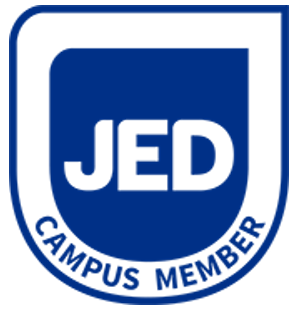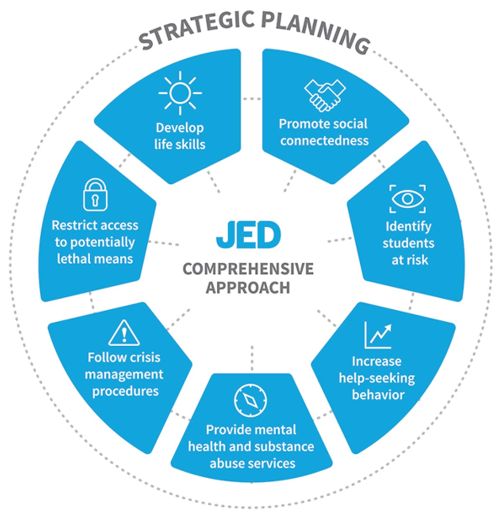Atlanta Metropolitan State College is a JED Campus
 Atlanta Metropolitan State College (AMSC) has joined the JED Campus program in support of student well-being and mental health. The program is designed to identify opportunities to enhance emotional health and substance abuse and suicide prevention efforts on campus in order to ensure that schools have the strongest possible mental health safety nets. By joining JED Campus, Atlanta Metropolitan State College demonstrates a commitment to the emotional well-being of its students. JED Campus schools embark on a multi-year strategic collaboration that not only assesses and enhances the work that is already being done, but helps create positive, lasting, systemic change in the campus community. To learn more visit www.jedcampus.org
Atlanta Metropolitan State College (AMSC) has joined the JED Campus program in support of student well-being and mental health. The program is designed to identify opportunities to enhance emotional health and substance abuse and suicide prevention efforts on campus in order to ensure that schools have the strongest possible mental health safety nets. By joining JED Campus, Atlanta Metropolitan State College demonstrates a commitment to the emotional well-being of its students. JED Campus schools embark on a multi-year strategic collaboration that not only assesses and enhances the work that is already being done, but helps create positive, lasting, systemic change in the campus community. To learn more visit www.jedcampus.org
JED Strategic Plan Approach
 STRATEGIC PLANNING
STRATEGIC PLANNING
Strategic planning allows schools to anticipate and evaluate clinical and programming needs, examine how they deploy both personnel and financial resources to address challenges, coordinate efforts across campus, and evaluate programming effectiveness.
DEVELOP AND SUPPORT LIFE SKILLS
Supporting life skills education is valuable in teaching healthy ways to cope with the stress of college life. Some of the life skills that are important to a student's well-being include managing friendships and relationships, problem-solving, decision making, identifying and managing emotions, healthy living, and finding the purpose, meaning and identity.
PROMOTE SOCIAL CONNECTEDNESS
Research has shown that loneliness and isolation are significant risk factors for mental health problems and/or suicidal behavior. Therefore, supportive social relationships and feeling connected to campus, family and friends are protective factors that can help lower risk.
IDENTIFY STUDENTS AT RISK
It is important to take action to identify students at risk for mental health problems and/or suicidal behavior, and also to promote emotional health awareness among those who interact with students the most - "gatekeepers" such as residence hall staff, academic advisors, faculty and even fellow students - as it is vital for these people to be able to recognize and refer a student who might be in distress.
INCREASE HELP SEEKING BEHAVIOR
Many students who need help may be reluctant or unsure of how to seek it out. Obstacles to help-seeking include lack of awareness of mental health services, skepticism about the effectiveness of treatment, prejudices associated-with mental illness, and uncertainty about costs or insurance coverage. Campuses should engage in a variety of activities designed to increase the likelihood that a student in need will seek help.
PROVIDE MENTAL HEALTH AND SUBSTANCE ABUSE SERVICES
It is essential to offer accessible, consistent and high-quality mental health services to students. To make mental health and substance abuse care more comprehensive, it should include strong and flexible services, adequate staffing levels and staff diversity reflective of the student population, flexibility in treatment approaches, and clinic hours that are reflective of student schedules. Since most college clinics are free, the length of treatment is often limited. Therefore, it is important that campus mental health services can assist students in finding off-campus resources that can provide long-term care if needed.
FOLLOW CRISIS MANAGEMENT PROCEDURE RESTRICT ACCESS TO POTENTIALLY LETHAL MEANS
The campus should have access to a well-publicized 24/7 crisis phone and/or chat line either through campus resources or local/national services. There should be a process in place to share information (as legally appropriate) between local ERs and school health and/or counseling services.
RESTRICT ACCESS TO POTENTIALLY LETHAL MEANS
It has been well established that if the means to self-harm are removed or limited in an environment, it can prevent suicide and even limit accidental deaths. This is called "means restriction. " Limiting students' access to weapons, poisonous chemicals and rooftops, windows or other high places are all means restriction activities. Each campus should do an environmental scan for potential access to lethal or dangerous means.
JED Campus Program Committee
- Iris Shanklin Director Student Life & Leadership
- Morgan Felder Director Student Support Services TRIO Programs
- Kenneth Stallings Director Upward Bound West Clayton
- Sharon Duhart Director Center for Academic Advising & Success
- Erica Taylor Academic Case Manager (Achieve Atlanta)
- David Holloway AMSC Student
- Dorothy Williams: Director Counseling & Support Services
- Larry Stewart Associate Professor of Criminal Justice
- Michael Montgomery Interim Director, Development & External Affairs
- Kokila Ravi Director Online & Spec Learning Program
- Kimberly Brooks Administrative Support Science, Math, & Health Professions
- Tichina Powers Database Specialist Management Information Systems
- Wiley Gammon Chief, AMSC Police Department
- Marcus Hill Lieutenant, AMSC Police Department
- Lisa Mallory Professor of English Humanities and Fine Arts Division
- Mitzi Williams Chief Human Resources Officer
- Deborah Lee Director, Upward Bound - Fulton
Atlanta Metropolitan State College
1630 Metropolitan Parkway SW
Atlanta, GA 30310
Counseling Center
Building 650, Room 252
Phone (404) 756-4016 24/7 Support Line 1-833-855-0079
- A 24/7/365 mental health support line for in-the-moment support and linkages to next steps, regardless of time of day or your location. Call us anytime, anyplace at 1-833-855-0079
- No cost Telehealth and in-person treatment sessions provided by a diverse network of licensed mental health clinicians. To learn about your options just call us at 1-833-855-0079.
- Virtual Psychiatric Clinics to offer assessment and medication management. To learn about your options just call us at 1-800-820-3472.